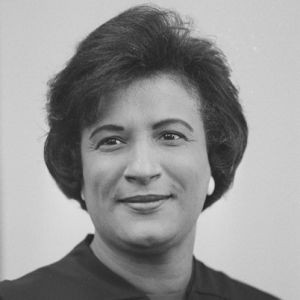

Constance B. Motley was born in New Haven, Connecticut, in 1921. The ninth of 12 children of West Indian parents who had migrated to the United States from the Caribbean island of Nevis, she grew up on the outskirts of the Yale University campus.
Despite Motley’s strong academic ability and keen motivation, her parents could not afford to send her or her 11 brothers and sisters to college. For a few months following her graduation from high school, she struggled to earn a living as a domestic worker. But, after hearing her give a speech, a wealthy white philanthropist offered to pay for her college education.
She graduated from NYU and began her studies at Columbia Law School in February of 1944. During her first year of law school, she met Thurgood Marshall, who offered her a job as a law clerk in the NAACP’s New York office. After receiving her law degree in 1946, she became a full-fledged member of the legal staff.
Over the next 15 years, Constance B. Motley served as a key attorney in dozens of school desegregation cases handled by the NAACP Legal defense Fund, appearing in dramatic courtroom trials in 11 southern states and the District of Columbia.
After helping Thurgood Marshall write the legal briefs for the historic Brown v. Board of Education case, she went on to argue ten of her own before the U.S. Supreme Court, winning nine of them.
In 1956, she helped Autherine Lucy win the right to attend graduate school at the University of Alabama at Tuscaloosa. Six years later, Motley, won national recognition for representing James H. Meredith during his long but ultimately successful battle to gain admission to the University of Mississippi.
As U.S. Congressman John Lewis remembered on his Web site, “in the heart of the American South, during the early days of the Civil Rights Movement in the late 50’s and 60’s, there were only two lawyers that made white segregationists tremble and gave civil rights workers hope—Constance Baker Motley and Thurgood Marshall.”
In 1966, Senator Robert F. Kennedy of New York requested that President Lyndon B. Johnson nominate Constance Motley for a federal district court judgeship. Johnson agreed, and despite vigorous opposition to her appointment both from conservative southern senators and other federal judges—at the time, only two other women were U.S. district judges—the Senate confirmed the nomination in August of that year.
Motley thus became the nation’s first female African American federal judge. Committed to her work, and convinced of how important it was to others, Motley continued to try cases until her death in September 2005.
